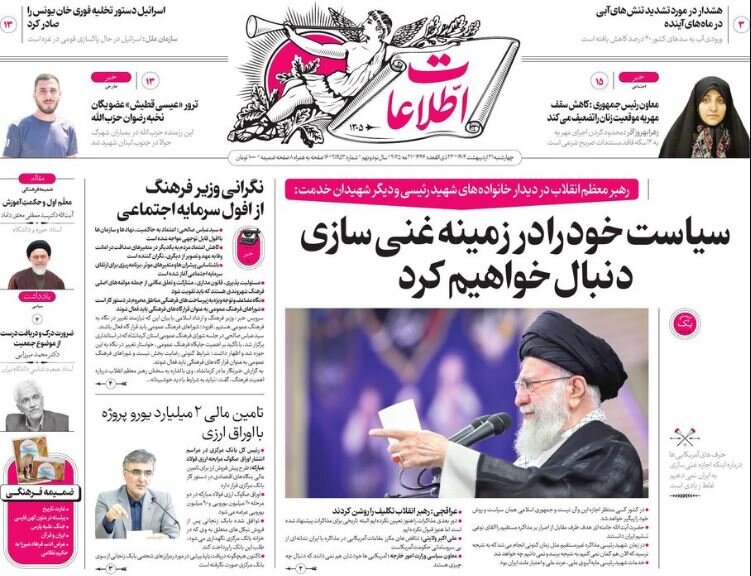In an interview with Tehran-Gepolitics professor Abdolreza Faraji Rad, Ettelaat looked into the recent tense status of Iran and the United States after several rounds of indirect negotiations.
He said: The four-round negotiations were full of ups and downs. It was decided that Iran and the US would enter into technical negotiations in the fifth round, and this was officially announced. But again, we heard a contradictory statement from the Americans and said that Iran would not be allowed to enrich uranium. Now, the United States must clarify its position. That is, Iran has announced that it is at its highest level and is not ready to reduce enrichment to zero. Now, round 5 will be sensitive. The US will either begin technical negotiations based on what they said in the fourth round, or negotiations will be suspended, and mediators, Oman or other countries will find a solution to resume negotiations.
Siasat-e-Rooz: totally irrational and illogical
Siasat-e-Rooz dedicated the headlines of excessive demands from consultations with Iran and the reaction of revolutionary leaders to these demands. The reality is that the West, particularly the US, is that its emphasis on a complete halt of Iran’s nuclear enrichment, is not merely due to nuclear concerns, but is part of a long-term strategy to contain the state power of Iran’s Islamic Republic. Therefore, it is believed that the leader’s decisive response to this issue is more than a diplomatic attitude. In a situation where the US is trying to undermine Iran’s regional status by creating false bipolarity after Trump visits the region, the quick and clear warnings from leaders of this process are considered a kind of strategic move to right-hand the path of negotiation and warnings to the domestic decision-making structure. This warning contains several important messages. First, Iran’s Islamic Republic will never put pressure on him to retreat from its nuclear rights. Second, negotiating teams must be wary of deceptive messages and plans that appear to be “neutral” but appear to be misguided by the US. Third, ongoing negotiations are only justified if the “dignity, wisdom, and convenience” of the Islamic Republic system is considered.
Iran: The Thehran-Muscat-Doha Triangle at the Talks Table
In the memo, the Iranian newspaper discussed the importance of Tehran’s dialogue forum, writing: Tehran has once again become one of the most important regional and international dialogue forums these days. The forum was not only a platform for exchanging opinions on the future of the region, but also an opportunity for sensitive diplomatic consultations, including indirect negotiations between Iran and the United States. But what made the forum more than a typical diplomatic conference was the presence of key figures from players from neighboring countries and key regions. Perhaps the most important development at the conference was the trilateral consultations between Iran, Oman and Qatar. According to Araghchi, they support the consultation and are trying to help it. Iran’s clear stance of “our position is clear and we will continue to abundance” shows that while Iran is ready for consultation, it does not abandon its principles and red lines and is openly standing up against political pressure. In a changing regional environment, meetings such as the Tehran Forum and Trilateral Consultations are on one side, with windows for active diplomacy, emphasizing the Islamic Republic of Iran following a stable foreign policy.
Arman-e-Emrooz: Negotiation structure essentials
If the negotiation process continues based on the framework and considerations of the Islamic Republic, engagement of the private cooperative sector will help advance negotiations. In reality, economic benefits provide more weight and importance to the parties in the current situation, and the composition of opposing representatives also reflects this issue. Unfortunately, this issue was not given much attention during the ratification of the JCPOA, and from the perspective of economic actors, the JCPOA did not desirably promote economic activity in international trade. The need to raise issues such as opposing benefits on investment in the country and significantly remove oppressive sanctions double the importance of this issue. It should be noted that the international system has sought to cause disruption in the interaction of Iranian economic actors by imposing sanctions in recent years. Of course, economic actors have always tried to neutralize them with great effort, but they must be given more space to play their role.

